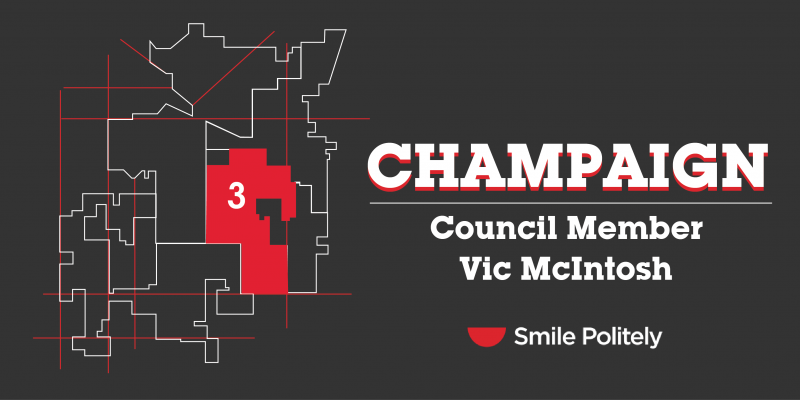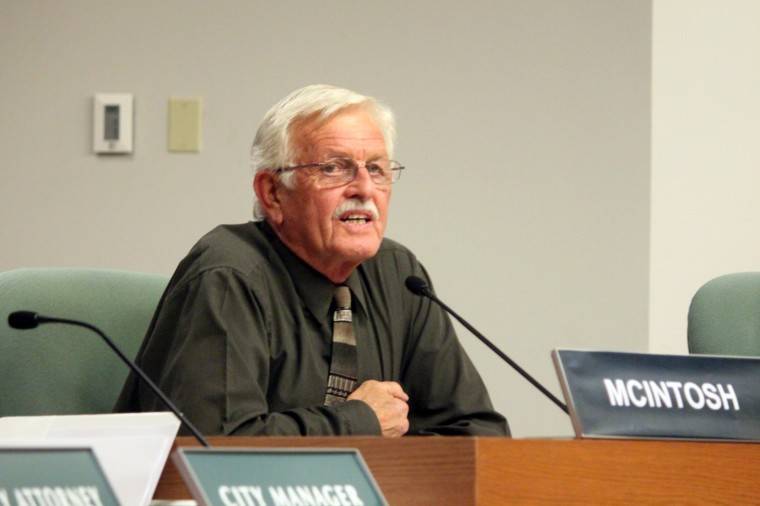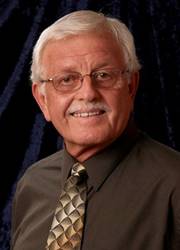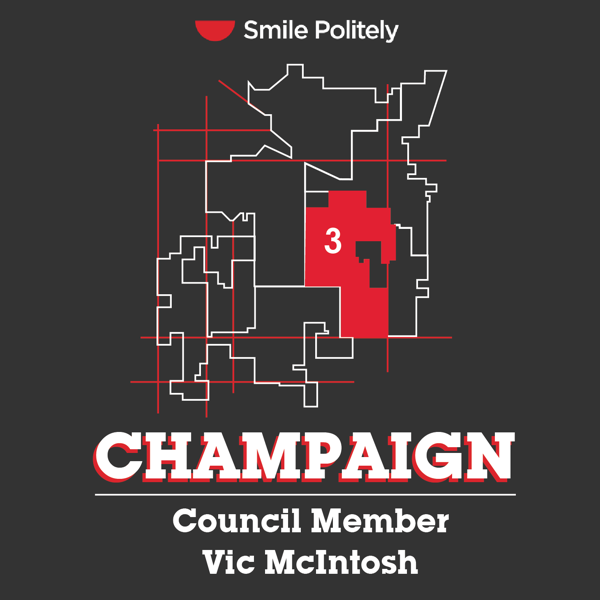
I recently chatted with Vic McIntosh as part of our ongoing series on elected officials. Here’s what he had to say.
Question 1.
Smile Politely: What are your connections to the city of Champaign?
Vic McIntosh: I’m a lifelong resident. I’ve been here since I was one year old. I moved here with my family from Deland, Illinois when I was one year old, and I’ve lived here ever since, except for my two tours in Vietnam.
Question 2.
SP: What is your professional background?
McIntosh: When I got out of the service, I came back home and started driving a truck. I drove over all over the road for about 18 years. Then I got a job as a shop supervisor for Central Management Services.
Question 3.
SP: How did you get involved with city council?
McIntosh: I’ve always been involved a little bit in the political scene. With helping candidates and things like that. But then one time, there was a peddlers ordinance coming up, talking about fireworks peddlers. That was back when all these fireworks peddlers would turn up all over the city and sell fireworks right before the 4th of July. Right before it came before council, at about 2 o’clock in the morning, there was a peddler right around the corner from me. People began setting them off—there was bottle rockets on my roof, and I was awakened by the bottle rockets. I decided to come to the city and express my views about the peddlers ordinance. It was so interesting, I started going every Tuesday night to council and watched what went on. Then I decided I would make a run for it.
I was initially appointed to fill a vacant slot. The first time I ran, it was for an at large position. I initially lost by 200 votes or something. So I continued going to council for two more years. Then, when the previous council member retired, I ran for District 3 seat, which I’m now holding for my third term. I was off for two years because my wife was ill, but then I ran again, and now I’m carrying a full four-year term.
Question 4.
SP: How would you describe the role of city council in the city Champaign?
McIntosh: We have people hired to actually run the city. It’s our job as council members to make sure that they do the things that citizens need. And that they do the right thing for the citizens of this community. We don’t have a directive role, like in Urbana, we are in an advisory role. It takes five votes to get something or to stop something, except for a budget request, which takes 6. In Urbana, things run by the pleasure of the mayor, but that’s not how things are in Champaign.
Question 5.
SP: What have been the highlights of your time on city council, and what did you specifically do to contribute to those highlights?
McIntosh: The biggest highlight was I put together the plan that funded and built the new library. That has been my biggest accomplishment. One year, it was my push to get Bradley Avenue redone. We ended up with about a $5 million surplus one year, and we took that surplus and were able to get Bradley Avenue done four years sooner than would have otherwise happened. The latest thing I’ve been proud of has been getting the Gateway Motel torn down. I was the main advocate to get the tax abatement done on that and get it demolished and torn down because it had become such a blight on the city. Plus it demanded a lot from the police and fire departments because it was a vacant building.

Question 6.
SP: What about the low points during your time on city council?
McIntosh: That’s a tough one. The smoking ban comes to mind. That was a low point for me when they disallowed smoking in bars. It got voted in, and then voted down, and then the state come through and made it a state law. I’m a supporter of free rights, and I thought businesses had a right to make decisions about their buildings. Losing my first election was also a low point. But I put my boots back on, decided that’s what I wanted to do, and have remained here then.
Question 7.
SP: What are the most important issues facing your district?
McIntosh: I have Garden Hills in my district. Garden Hills, as you’ve read in the newspaper, has had some problems with theft and things like that. Working with the Garden Hills Neighborhood Association, residents, and the police department and neighborhood services to help that part of town has been a strong concern of mine throughout my tenure.
Garden Hills is one of the few subdivisions in town that’s still sitting without curb and gutter. There are no storm sewers there. There’s just a small sidewalk put in two years ago. Fixing those things is important to me. It’s a heavy rental property neighborhood, so some people don’t have an interest in the home they live in. That’s created a lot of problems. Recently, we had a breakfast with all the landlords, and most of them came, and listened to staff about the problems that were going on. Now we’re trying to work out solutions with their help. We’re working with people to improve their properties. We just put them in the enterprise zone. It’s the first time they’ve been there. And hopefully we can help fund storm sewers, sidewalks, and streetlights. It’s will take a while, but it’s a goal, but it’s something I think that will help them out a lot.
Question 8.
SP: What does Champaign still need to do in terms of economic development?
McIntosh: I think one of the things that has been beneficial is the number of tech companies into this community. I think with big broadband coming in, that is very key, and will bring in good paying jobs. And obviously working with the university. That’s our biggest employer and the biggest asset we have in this community. Continuing to work with them is key. I would like to see more small businesses that supply the goods that the university and businesses in town—businesses like Kraft—I’d like to see those businesses be based right here. Instead of having supplies trucked in, I’d like to see them made right here in town. I think that would be a good creation of regular, good jobs as well as the high tech jobs.
Question 9.
SP: Would you change anything about how the Champaign city council works?
McIntosh: No. I wouldn’t. I really believe in the city manager form of government. From looking around the country at different cities, that’s the best system. We have a nonpartisan group. We all are who we are, but in my experience there hasn’t been party things dictate issues we decide. People on council have looked at them as city problems and rather than as political problems, and I would not like to see us change that.
Question 10.
SP: Has the mayoral race affected city council operations in any way?
McIntosh: I have not seen any of that yet. I think that goes back to the 5-vote rule. It takes five people to move anything. I think having this many people running is a good thing because it gives the community a choice. I don’t see the effect on city council because of how city government works. People still need to get their 5 votes. I don’t expect to.
Question 11.
SP: What are your views on the parking situation in downtown Champaign?
McIntosh: The cost of parking doesn’t seem to have affected anything. You go down there and maybe have to go around the block two or three times, but I don’t think that’s deterred business in downtown. If you go to Market Street mall, you’re going to walk at least two blocks once you park, and if you park two blocks from downtown, you can park for a quarter. So I don’t think it’s hurt downtown. One of the reasons the rates raised is that people who worked downtown were using those places right in front of businesses to park all day. Business owners were complaining because cars would park there all day. The changes were to keep turnover in front of businesses in downtown.
Question 12.
SP: How would you describe your political philosophy?
McIntosh: I’d say I’m a conservative. But I’m not right-wing. I’m not way off to the right. I’m pretty much middle of the road guy. I can’t say I’m neutral or in the middle. I just can’t say that. I lean more conservative. But the things I deal with on a day-to-day basis, you have to look at people needing help and working with people instead of just worrying about ideology. That’s my belief in what makes the city work so well together. I think council, pretty much the whole time I’ve been alive, has worked for the city and the residents rather than the party.
 Question 13.
Question 13.
SP: Who are your political heroes?
McIntosh: Stan Weaver from the city of Urbana. He’s at the top of my list of political people because he is one of the strongest and most straightforward politicians I’ve worked with. He rose from mayor of the city of Urbana to become state senator. He got into high leadership; he was a number two man over in Springfield. He got that way and got things done because he used common sense and worked with both sides to make things happen. He was always a straight shooter. He wasn’t afraid to tell you if he didn’t think something was right. I think he benefitted my career greatly.
June Mank was a mentor to me on council years ago. She helped me get started. What she did for her district and for Garden Hills was a great lesson to me.
Question 14.
SP: What is your vision for where the city of Champaign should go in the coming years?
McIntosh: The city is going to continue to grow. In 10 years, it’s going to be a major party of the state of Illinois. But I don’t think the growth of the city should come in the width of the city. Development should keep coming, as it is now, in the inner city. I hope that’s where the city will continue to go, and I think it will.
Question 15.
SP: What are your favorite places in Champaign?
McIntosh: I’m not a big box store guy. I think downtown has turned into a very special place, and I was happy to be part of that, bringing the downtown back. It’s become a great place for people to go and relax and listen to a little music.
And I think our parks system is unbeatable. I love to take the grandkids out to the parks.








